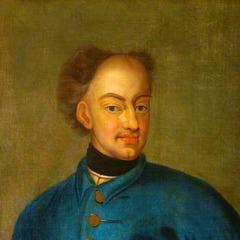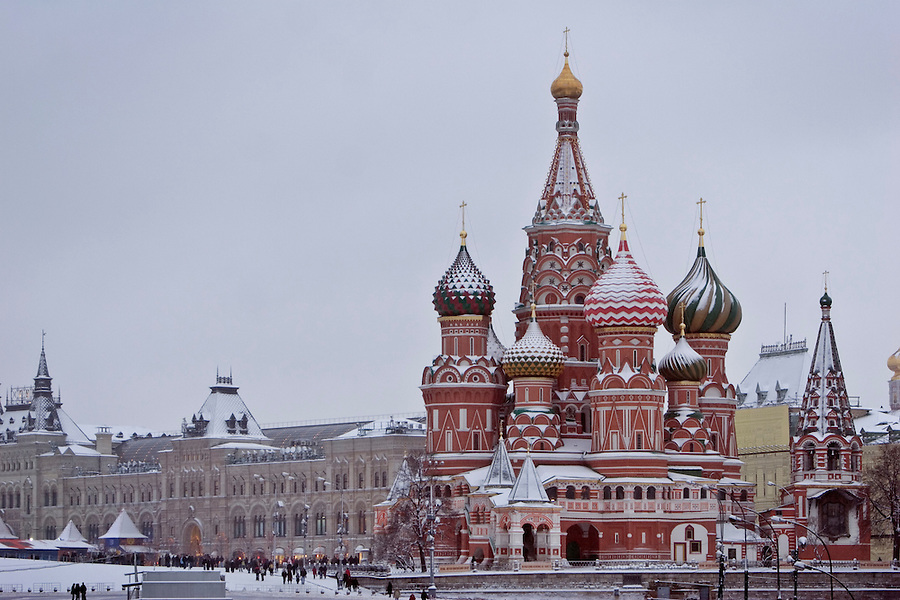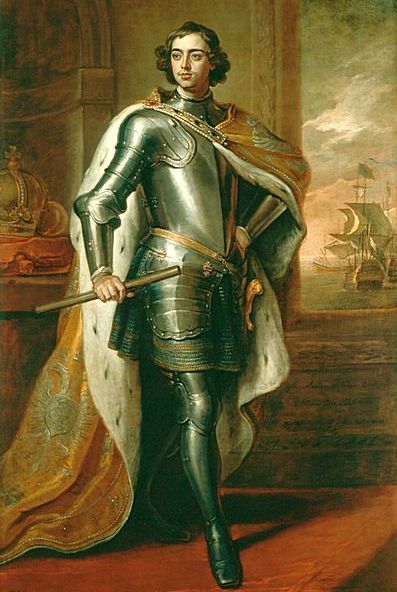It's highly ironic that Karl (Often anglicized to Charles) XII¹ is referred to as the 'Alexander of the North', given that his reign saw the end of Sweden as an empire and significant global power. While Karl may have started out strong by conquering Denmark, Poland, and parts of Russia, he ultimately failed his country abroad and at home. A nickname that makes more sense is 'The Swedish Meteor'. Karl earned this nickname because of, you guessed it, his meteoric rise to power, and quick fall from grace.
Karl was groomed to be king from a very young age. After his mother's death in 1693, Karl's father, Karl XI, took Karl with him everywhere, including him in royal progresses, meetings of the Riksdag, and other monarchical duties. Daddy Karl also saw to it that young Karl had the best tutors and religious mentors. When Karl XI died in 1697 the fifteen year old Karl was ready to assume the throne.²
When the power's abroad heard about Karl's ascension to the throne, many countries saw the Swedish Empire as ripe for the picking, especially after negotiations for a royal marriage between Karl and a Danish Princess broke down. Not wanting to waste the opportunity of a lifetime, Denmark, Poland-Lithuania, Russia, and Saxony banded together, and with promises from the Swedish nobility that they would start rebelling if a war started, this coalition started attacking Sweden from all sides.
However, young Karl was no dummy. He went on the offensive, and invaded Danish Zeeland, and at the Battle of Narva he took the Danes out of the war with one blow. It wasn't long before Karl's armies had driven the Russians and Saxons out of the Swedish provinces on the Baltic. With 3/4 of his enemies driven back, Karl turned his sights on the Polish-Lithuanian Commonwealth.
Many of these early achievements cannot be attributed directly to Karl. He was still young, and he didn't have a great deal of war experience. However, he was smart enough to listen to the advisers and generals left to him by his father. As time went on Karl became better at battlefield strategy, and many of his advisers died. By 1702 Karl was almost entirely in charge.
It was this year that Karl invaded Poland. Poland was a deeply divided country, and they were no match for the united Swedes. Karl overthrew the reigning monarch, Augustus II, and installed Pole Stanisław Leszczyński as king. Safe in the knowledge that Stanisław would do what he was told, Karl made Poland his base for invading Russia.
Now, Karl had been doing very well up until then. He'd been at war for the entirety of his reign, but had still managed to help with administrative decisions back at home. Had Karl decided that enough was enough, and gone back home he might have been remembered as a hero King who conquered vast swathes of territory, and subdued Sweden's enemies. However, in 1706 Karl made a fatal mistake--he invaded Russia.
We've discussed Karl's invasion of Russia before, so I won't go into too much detail here. But here's a brief summary: Karl invades western Russia, and reconquers the Baltic provinces that Russia had taken. The Russian soldiers scorch the earth behind them, and attack the Swedish baggage trains, leaving the Swedes without supplies. When they lost battles, the Russians withdrew further into Russia. Though Karl made it all the way to Moscow, lack of supplies forced him to turn back, and a Russian victory at Poltava forced Karl to flee to Turkey.
Turkey was a seemingly good place to seek refuge. The Turkish sultanate was friendly to the Swedes, and the Turks also had a beef with Russia. The Turks agreed to jointly attack Russia. However, though Karl requested another army from Sweden it never arrived, and efforts to attack Russia petered out.
In 1714 Karl left Istanbul for good, and headed to the Swedish provinces in Pomerania. His five years in Turkey had shifted Karl's priorities from expanding Swedish territory and punishing his enemies to merely keeping his empire intact, and making peace. Karl decided that ceding pieces of land, either for money or treaties, was the only way to go. He ceded vast swathes of Swedish territories, and lost others to various German kingdoms. In 1718 Karl was shot through the head while fighting the Norwegians. He died, leaving no children to succeed him.
Karl was a king of Sweden, who didn't actually spend all that much time in Sweden. He was deeply religious, and a highly intellectual man. He didn't drink alcohol or have affairs with women. His close relationships with his fellow soldiers have lead many historians to speculate that he may have been homosexual. Towards the end of his life he was reviled by his own people, and rumors that he was shot by one of his own men abound.
Karl is heartily disliked by most modern Swedes. Not only do they blame them for the loss of their empire, but they also blame him for the enormous amount of money and lives that his wars cost. Additionally, Karl XII has become an icon for far-right Swedish Neo-Nazi groups, which certainly doesn't boost his posthumous reputation.
¹I refer to him as 'Karl' rather than 'Charles' in this post because it makes very little sense to refer to a King of Sweden by an English name.
²Karl XI had arranged for a regency should he die before Karl XII came of age. However, due to internal fighting within the regency, the Riksdag asked Karl to assume the throne early.
Sources
Charles XII- King of Sweden
The Blazing Career and Mysterious Death of 'The Swedish Meteor'
 |
| Karl on a horse |
When the power's abroad heard about Karl's ascension to the throne, many countries saw the Swedish Empire as ripe for the picking, especially after negotiations for a royal marriage between Karl and a Danish Princess broke down. Not wanting to waste the opportunity of a lifetime, Denmark, Poland-Lithuania, Russia, and Saxony banded together, and with promises from the Swedish nobility that they would start rebelling if a war started, this coalition started attacking Sweden from all sides.
However, young Karl was no dummy. He went on the offensive, and invaded Danish Zeeland, and at the Battle of Narva he took the Danes out of the war with one blow. It wasn't long before Karl's armies had driven the Russians and Saxons out of the Swedish provinces on the Baltic. With 3/4 of his enemies driven back, Karl turned his sights on the Polish-Lithuanian Commonwealth.
 |
| Karl not on a horse. |
It was this year that Karl invaded Poland. Poland was a deeply divided country, and they were no match for the united Swedes. Karl overthrew the reigning monarch, Augustus II, and installed Pole Stanisław Leszczyński as king. Safe in the knowledge that Stanisław would do what he was told, Karl made Poland his base for invading Russia.
Now, Karl had been doing very well up until then. He'd been at war for the entirety of his reign, but had still managed to help with administrative decisions back at home. Had Karl decided that enough was enough, and gone back home he might have been remembered as a hero King who conquered vast swathes of territory, and subdued Sweden's enemies. However, in 1706 Karl made a fatal mistake--he invaded Russia.
 |
| The Swedish Empire |
Turkey was a seemingly good place to seek refuge. The Turkish sultanate was friendly to the Swedes, and the Turks also had a beef with Russia. The Turks agreed to jointly attack Russia. However, though Karl requested another army from Sweden it never arrived, and efforts to attack Russia petered out.
In 1714 Karl left Istanbul for good, and headed to the Swedish provinces in Pomerania. His five years in Turkey had shifted Karl's priorities from expanding Swedish territory and punishing his enemies to merely keeping his empire intact, and making peace. Karl decided that ceding pieces of land, either for money or treaties, was the only way to go. He ceded vast swathes of Swedish territories, and lost others to various German kingdoms. In 1718 Karl was shot through the head while fighting the Norwegians. He died, leaving no children to succeed him.
 |
| Death mask of Karl XII, also not on a horse. |
Karl is heartily disliked by most modern Swedes. Not only do they blame them for the loss of their empire, but they also blame him for the enormous amount of money and lives that his wars cost. Additionally, Karl XII has become an icon for far-right Swedish Neo-Nazi groups, which certainly doesn't boost his posthumous reputation.
¹I refer to him as 'Karl' rather than 'Charles' in this post because it makes very little sense to refer to a King of Sweden by an English name.
²Karl XI had arranged for a regency should he die before Karl XII came of age. However, due to internal fighting within the regency, the Riksdag asked Karl to assume the throne early.
Charles XII- King of Sweden
The Blazing Career and Mysterious Death of 'The Swedish Meteor'





